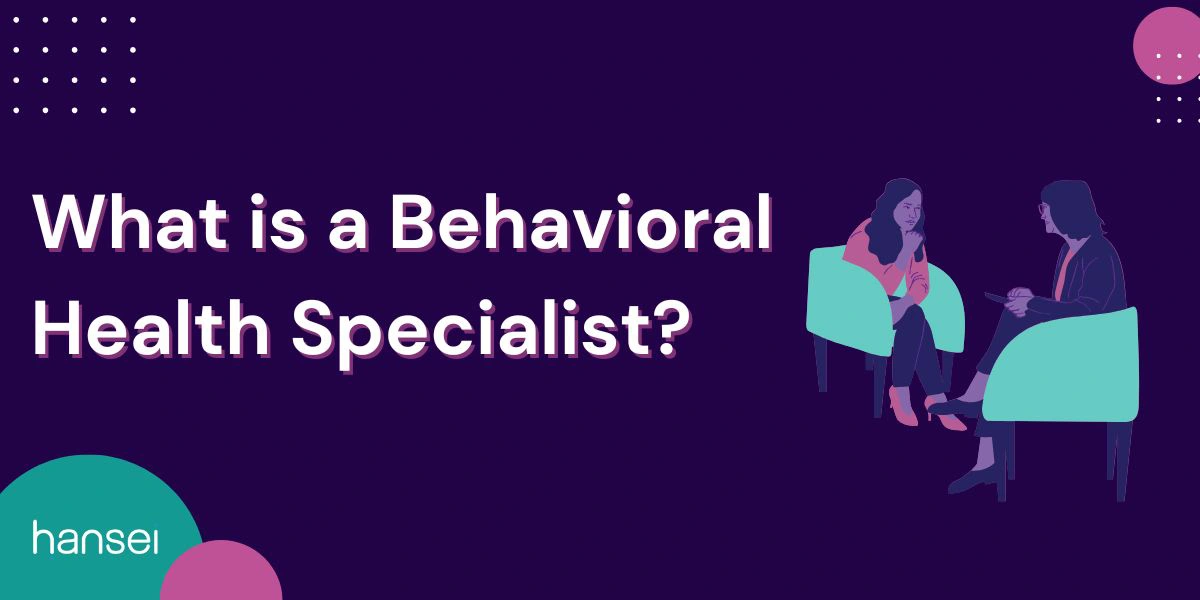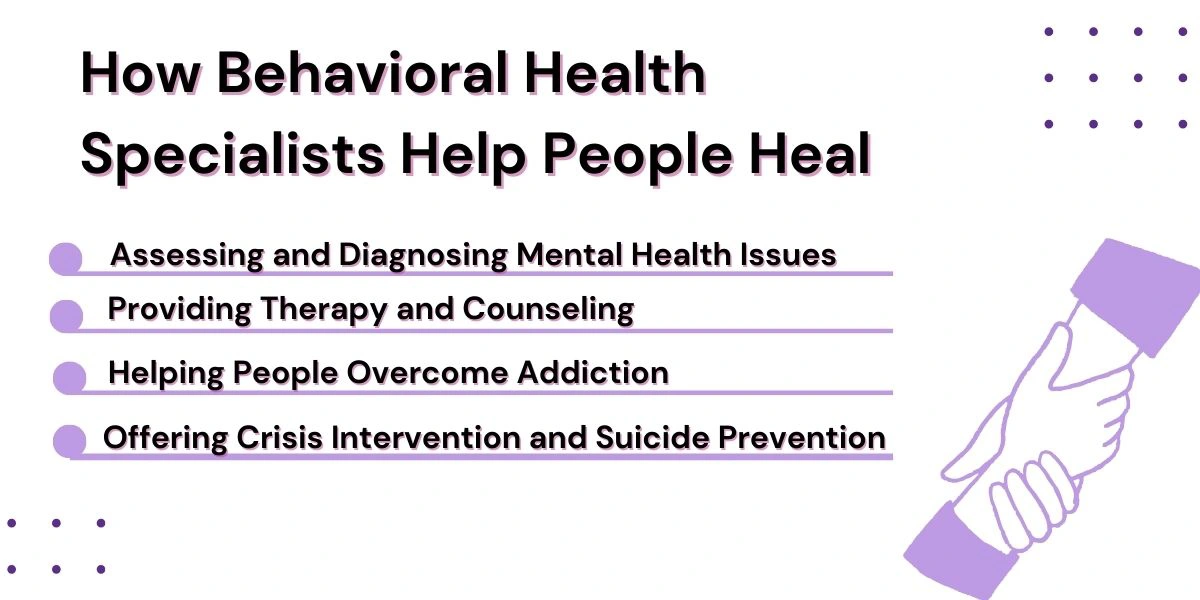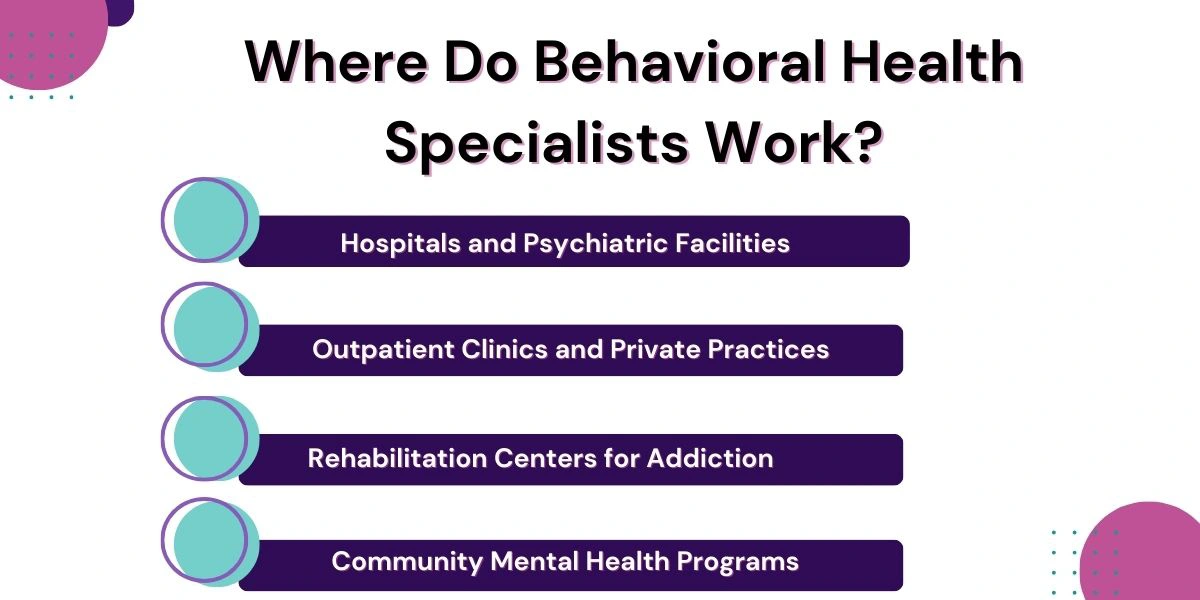Blog

Mental health and substance use disorders affect millions of people across the U.S., yet many struggle to find the support they need. Whether it’s anxiety, depression, PTSD, or addiction, navigating behavioral health challenges can feel overwhelming. This is where behavioral health specialists come in—they provide professional guidance, therapy, and treatment to help people regain control of their lives.
But what exactly does a behavioral health specialist do? How do they help individuals struggling with mental health or addiction issues? And how can you find the right specialist for you or a loved one?
What Does a Behavioral Health Specialist Do?
A behavioral health specialist (BHS) is a trained professional who helps people manage mental health conditions, emotional struggles, and substance use disorders. They use a variety of techniques, including therapy, crisis intervention, and behavior modification, to help individuals develop healthier thought patterns and coping mechanisms.
These specialists don’t just work in one setting. You’ll find them in hospitals, rehab centers, outpatient clinics, schools, and even corporate wellness programs. Their work varies widely, but at the core, they help people navigate:
- Mental health conditions like depression, anxiety, and PTSD.
- Substance use disorders, including alcohol and drug addiction.
- Emotional distress, including grief, trauma, and relationship challenges.
- Behavioral disorders such as ADHD and obsessive-compulsive disorder (OCD).
According to the National Alliance on Mental Illness (NAMI), about 1 in 5 U.S. adults experiences a mental illness each year, and only 47% receive treatment. This highlights the urgent need for qualified behavioral health specialists to help bridge the gap in care.

How Behavioral Health Specialists Help People Heal
The work of a behavioral health specialist is deeply personal and transformative. Here’s how they support individuals on their mental health journey:
1. Assessing and Diagnosing Mental Health Issues
When someone is struggling, a behavioral health specialist helps identify what’s going on. They conduct clinical assessments through interviews, psychological tests, and observations to determine the best treatment plan.
2. Providing Therapy and Counseling
Talk therapy is a major component of what they do. Whether it’s cognitive-behavioral therapy (CBT), dialectical behavior therapy (DBT), or trauma-focused therapy, specialists tailor their approach based on the individual’s needs.
For example, research from the American Psychological Association (APA) shows that CBT is effective for 60–80% of individuals with depression and anxiety.
3. Helping People Overcome Addiction
Substance use disorder is a growing crisis. In 2021, over 46 million people in the U.S. were diagnosed with a substance use disorder, yet only 6% received treatment (SAMHSA). Behavioral health specialists play a key role in addiction recovery by providing:
- Individual and group therapy for addiction treatment.
- Medication-assisted treatment (MAT) for opioid and alcohol dependence.
- Relapse prevention strategies to maintain long-term sobriety.
4. Offering Crisis Intervention and Suicide Prevention
For individuals in crisis, behavioral health specialists provide emergency mental health services. This includes working in psychiatric hospitals, crisis hotlines, and emergency rooms to stabilize individuals at risk of self-harm or suicide.
According to the Centers for Disease Control and Prevention (CDC), suicide is now a leading cause of death in the U.S., with over 48,000 deaths in 2021. Behavioral health specialists are often the first point of contact in suicide prevention, providing immediate support and referrals to long-term care.
What Qualifications Do Behavioral Health Specialists Have?
The training and credentials of behavioral health specialists vary, but most hold at least a master’s degree in psychology, social work, counseling, or a related field. Common credentials include:
- Licensed Clinical Social Workers (LCSW)
- Licensed Professional Counselors (LPC)
- Licensed Marriage and Family Therapists (LMFT)
- Clinical Psychologists (Ph.D. or Psy.D.)
- Psychiatrists (MD or DO), who can prescribe medications
Becoming a behavioral health specialist requires extensive clinical training, licensure, and continuing education. Many also obtain certifications in trauma therapy, addiction counseling, and specialized treatment modalities.

Where Do Behavioral Health Specialists Work?
You’ll find behavioral health specialists in a wide range of settings, each offering different levels of care.
- Hospitals and Psychiatric Facilities – Behavioral health specialists work with patients in psychiatric hospitals and emergency departments, providing crisis stabilization and inpatient therapy.
- Outpatient Clinics and Private Practices – Many specialists provide long-term therapy and counseling in outpatient settings, helping people manage conditions like anxiety, depression, and PTSD.
- Rehabilitation Centers for Addiction – Specialists in rehab centers focus on addiction recovery, guiding patients through detox, therapy, and aftercare planning to prevent relapse.
- Community and School-Based Mental Health Programs – Schools and community health organizations employ behavioral health specialists to support students, low-income populations, and individuals at risk of mental health crises.
How to Find a Behavioral Health Specialist
If you or someone you love needs behavioral health support, there are several ways to find a qualified specialist:
- Check your insurance provider’s directory to find in-network mental health professionals.
- Use online therapy platforms like BetterHelp or Talkspace for affordable virtual sessions.
- Ask your primary care physician for a referral to a trusted behavioral health provider.
- Search community mental health centers that offer low-cost or free therapy services.
With so many options available, it’s important to choose a specialist who aligns with your needs—whether it’s therapy, addiction treatment, or crisis intervention.
Taking the First Step Toward Mental Wellness
Behavioral health specialists play a life-changing role in mental health care, offering support, therapy, and treatment for those facing anxiety, depression, trauma, and addiction. With millions of Americans struggling with behavioral health conditions, access to trained specialists is more critical than ever. If you or a loved one is seeking support, don’t wait—help is available.
At Hansei Solutions, we specialize in mental health and addiction treatment solutions that connect individuals with the care they need. Our team works with leading behavioral health providers to ensure patients receive comprehensive, insurance-backed treatment. Contact Hansei Solutions today to get the guidance and support you deserve.

Ready to focus on providing healthcare? Let us lighten your load.
We’re here to address your pain points and create growth opportunities for your organization. We’re passionate about what we do, and it shows in every interaction. Learn what makes us tick and schedule a demo today.